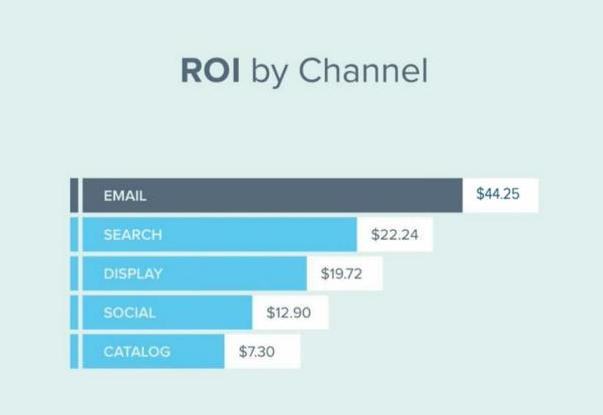
I recently joined an interesting webinar hosted by Litmus and Emma discussing the importance of email marketing and how to stand out in the crowded marketplace.
Below is an overview, however, the full slide deck and audio are available here: https://litmus.com/lp/8secondchallenge?utm_campaign=guestwebinar_emma&utm_source=litmusblog&utm_medium=blog
As the digital landscape has grown, email has continued to be the leading contender in the direct marketing space, nearly doubling the Return on Investment (ROI) in comparison to other digital channels.
We are living in our inboxes!

58% of adults check their email FIRST THING in the morning. Try sending your emails early in the day – you might see an uptick in opens.

Working in the inbox is now the #1 activity on a mobile device.
Writing, reading, sending, consuming and responding to email really has become the activity of choice during our downtime or while we’re traveling. That knowledge—coupled with the fact that people check their phones about 150 times a day—means there is a lot of opportunity for people to see that email.

BUT…the average adult attention span is just 8 seconds, which dropped from 12 seconds in 2000. We are now clocked under the goldfish that has an attention span of 9 seconds!!
How do we take this challenge and turn it into an opportunity?
By 2015, the average number of emails people receive will be up to 84 per day.
It’s said that the majority of those emails (about 87%) are “opt-in,” which means a legitimate email that people really want to see, rather than spam.
That stat combined with the fact that human attention span is just 8 seconds means email marketers must make an impression very quickly!
How can we do that?
#1: Optimize Your Subject Line and Pre-Header Text:
These can make or break your email from being opened or deleted.


Play on emotion to capture your readers’ attention.
According to Dan Hill, author of Emotionomics: Leveraging Emotions for Business Success, emotional processing in the brain resounds more loudly than the rational part of our brain.
But as powerful as words can be, we can all agree that it’s what we see that’s a lot more powerful than words.
#2: Use Images and Videos!
Now that you’ve gotten someone’s’ attention and they OPEN your email, let’s focus on what that experience is, and how you can reel them in to dig into your content.
Pictures are so powerful because over 50% of our brains are dedicated to processing images alone. The brain processes those images 60,000 times faster we can process text.

In email and print, we’ve been told to keep your content (images and text) “above the fold.” That term is going away with the rise of mobile viewing. People on their mobile device are not afraid to scroll. In fact, its encouraged to “embrace the scroll!”
However, there is still compelling evidence that suggests what happens when someone first opens your email is crucial to keeping his or her attention. Having flashy images “above the fold” is important!
Video is also a powerful tool for email.

#3: Design For Mobile:
When designing your email, keep in mind that 51% of all emails are opened on a mobile device. Design for the smallest screen first, and use responsive design templates to ensure your emails look great on any screen size.
This is an example of an email that wasn’t optimized for mobile. Look how small the text is!

Before we send out any email we always use Litmus, which is a tool to ensure your email content is formatted properly across all devices.
This is an example of what a Litmus test looks like.

#4: When Using Text, Organize it Versus Large Blocks of Copy!
Both video and images are powerful within an email, but when you do include text, readers prefer content that is organized through the use of lists and bullets. This is important because our brains can process this information easier, especially when someone scans an email.
In fact…

#5: Dedicate Time To Designing Your Call To Action Button:
When crafting your email a very important element is the call to action.
Focus on having ONE clear call to action in your email, and that should be carefully designed. It’s been proven that calls to action in a button have a higher click through rate on average than a text link. Knowing that 80% of readers are simply scanning your email, you’ll want to focus on making this button stand out.
The shape of the button, text, position of where it is in the email, the amount of white space around the button AND the color of the button are very important.
Also keep in mind…

#6: Use Human Faces To Guide A Readers Attention To a Call To Action
According to the “eye gaze” study, human beings have a natural tendency to follow the gaze of others. By using an image of people looking towards your call to action in the email you can subconsciously get them to pay attention to an area of mailing that they may have missed.

#7: Welcome Your New Readers!
Say hello to new readers through the use of an email.


To sum all of that up, here are a few examples of great emails. They are all clear, simple and direct!






